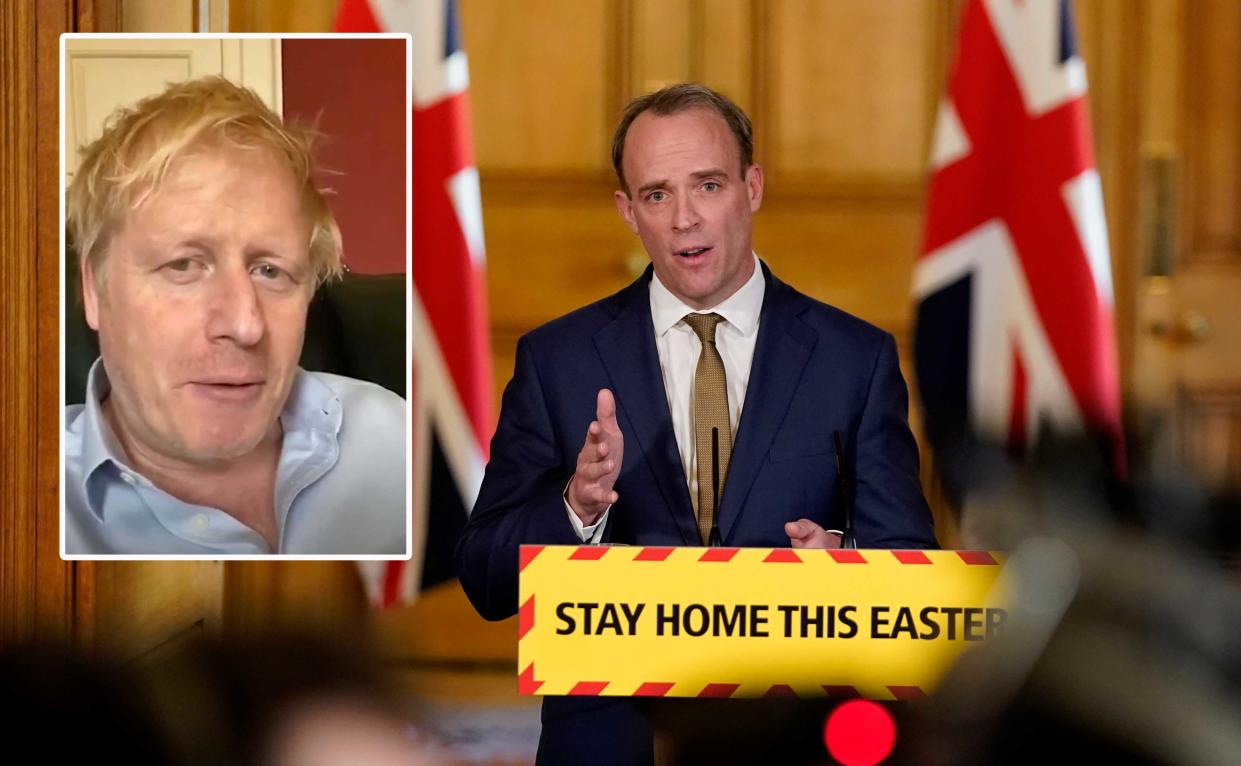Coronavirus lockdown extended for at least three weeks, government confirms

The UK’s coronavirus lockdown has been extended for at least another three weeks.
The restrictions, which have totally changed day-to-day life since being implemented last month, will stay in place as hundreds of COVID-19 deaths continue to be reported daily.
Dominic Raab, deputising for Boris Johnson, confirmed they would remain following Thursday’s Cobra meeting.
“Any change to our social distancing measures now would risk a significant increase in the spread of the virus,” the foreign secretary warned, outlining fears that easing up too early would risk a second big outbreak, risking lives and the economy.
He added that that too much had been “sacrificed... especially when we are beginning to see that our efforts are starting to pay off”.
Latest coronavirus news, updates and advice
Live: Follow all the latest updates from the UK and around the world
Fact-checker: The number of COVID-19 cases in your local area
6 charts and maps that explain how coronavirus is spreading
The rate of infection – how many people with the coronavirus are expected to go on to infect someone else – had not yet been reduced to the level the government wanted, he said.
There are still “issues with the virus spreading in some hospitals and in care homes”, he explained.
“The very clear advice we received is that any change to our social distancing measures now would risk a significant increase in the spread of the virus.
“That would threaten a second peak of the virus and substantially increase the number of deaths.
“It would undo the progress we have made to date and as a result would require an even longer period of the more restrictive social distancing measures.”

A total of 861 more deaths announced by the Department of Health on Thursday brought the UK’s total up to 13,729, with the number of published infections reaching six figures for the first time as 103,093 cases were confirmed.
When the lockdown was first set last month, Britons were told to only leave the house for essential purposes, like shopping for necessities, picking up medicine or exercise.
The restrictions are designed to slow the spread of the virus and stop the NHS getting overwhelmed with cases and it was anticipated they would remain in place until the outbreak went into decline.
Despite the need for an extension to the lockdown, which was expected, Raab – who is also first secretary of state – said the lockdown had been a success.
“There is light at the end of the tunnel but we are now at both a delicate and a dangerous stage in this pandemic,” he said.
Earlier today, Northern Ireland’s first minister Arlene Foster tweeted the message was simple.
Just finished COBR call with colleagues from across the UK. Simple message - what we are doing is having a clear impact - flattening curve, saving lives and protecting our NHS.
— Arlene Foster #We’llMeetAgain (@DUPleader) April 16, 2020
There are fears that relaxing measures without taking steps to control the virus’s spread will lead to another large outbreak and it is unclear if the country has yet passed the peak of this one.
Raab said measures could be changed when the government is confident it can, based on five tests.
These are ensuring the NHS can cope with demand, seeing a sustained fall in daily death rates to show the UK is past the peak, seeing data that the rate of infection is decreasing to manageable levels, ensuring testing capacity and personal protective equipment is available for future demand and being confident any action would not result in a second peak.
“But we will only do it when the evidence demonstrates that it is safe to do it,” he said.
“It could involve relaxing measures in some areas while strengthening measures in other areas.”
There is strong public support for a lockdown extension, according to a YouGov survey released today.
It shows 67% of people strongly backed extending it, with 24% “somewhat” supporting it. Just 5% opposed it while 4% said they didn’t know.
Labour has called on the government to release an exit strategy, though leader Keir Starmer has said the party backed an extension of the lockdown.
Health secretary Matt Hancock has also advised normality would not resume in the “short term” and an expert who has been advising the government on its coronavirus response said more testing will be needed as measures are relaxed.
“Because without that, our estimates show we have relatively little leeway,” Professor Neil Ferguson, from Imperial College London, told BBC Radio 4’s Today programme.
“If we relax measures too much then we’ll see a resurgence of transmission.
“What we really need is the ability to put something in their place. If we want to open schools, let people get back to work, then we need to keep transmission down in another manner.
“And I should say, it’s not going to be going back to normal. We will have to maintain some form of social distancing, a significant level of social distancing, probably indefinitely until we have a vaccine available.”
Some European countries have eased their lockdown restrictions, although this includes those which has had more severe restrictions.
Italy and Spain have allowed some industries to resume work while Austria planned to reopen kindergartens and schools and shops under 400 square metres. Denmark was also due to reopen schools.

 Yahoo News
Yahoo News 

